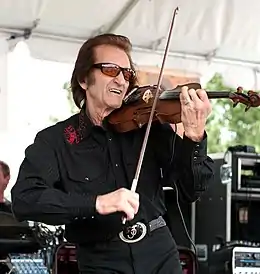Doug Kershaw
Doug Kershaw (né à Tiel Ridge en Louisiane le 24 janvier 1936[1]) est un violoniste cadien. Il commence sa carrière avec son frère Rusty Kershaw puis fait cavalier seul. Son grand succès est une version country de Diggy Liggy Lo (en).

| Naissance | |
|---|---|
| Nom de naissance |
Douglas James Kershaw |
| Nationalité | |
| Formation | |
| Activités | |
| Période d'activité |
depuis |
| Arme | |
|---|---|
| Instruments | |
| Genre artistique | |
| Site web | |
| Discographie |
Doug Kershaw discography (d) |
Carrière
Il a joué dans le film de Terrence Malick Les Moissons du ciel (Days of Heaven)
Doug Kershaw est compositeur et interprète notamment de Louisiana Man, qui fut vendu à plusieurs millions d'exemplaires et repris par plus de 800 musiciens. Avec le temps, ce morceau autobiographique est devenu un standard, emblématique de la nouvelle musique cajun.
Il joua entre autres avec Eric Clapton, Joni Mitchell, Arlo Guthrie, Ramblin Jack Elliot, Big Mama Thornton, Hank Williams et Mimi Farina. Il lui arriva également de jouer avec Jean-Luc Ponty (fusion jazz), Itzhak Perlman (classique) lors d'une performance télévisée.
Discographie
Albums
| Année | Album | Classement dans les charts | Label | |
|---|---|---|---|---|
| US Country | CAN | |||
| 1969 | The Cajun Way | — | — | Warner Bros. |
| 1970 | Spanish Moss | — | 86 | |
| 1971 | Doug Kershaw | — | — | |
| 1972 | Swamp Grass | — | — | |
| Devil's Elbow | — | — | ||
| 1973 | Douglas James Kershaw | — | — | |
| 1974 | Mama Kershaw's Boy | 14 | — | |
| 1975 | Alive & Pickin' | 32 | — | |
| 1976 | Ragin' Cajun | 44 | — | |
| 1977 | Flip, Flop & Fly | 47 | — | |
| 1978 | The Louisiana Man | — | — | |
| 1979 | Louisiana Cajun Country | — | — | Starfire |
| 1981 | Instant Hero | — | — | Scotti Bros. |
| 1989 | Hot Diggidy Doug | — | — | BGM |
| The Best of Doug Kershaw | — | — | Warner Bros. | |
Singles
| Year | Single | Chart Positions | Album | Label | |
|---|---|---|---|---|---|
| US Country | CAN Country | ||||
| 1967 | Ain't Gonna Get Me Down | — | — | single only | K-Ark |
| 1969 | You Fight Your Fight (I'll Fight Me) | — | — | The Cajun Way | Warner Bros. |
| Diggy Liggy Lo | 70 | 1 | |||
| 1970 | Orange Blossom Special | — | 9 | Spanish Moss | |
| Natural Man | — | — | Doug Kershaw | ||
| 1971 | Mama Said Yeah | — | — | ||
| Play, Fiddle, Play | — | — | |||
| 1972 | My Sally Jo | — | — | Devil's Elbow | |
| Jamestown Ferry | — | — | |||
| 1974 | "Mama's Got the Know How" | 77 | 83 | Mama Kershaw's Boy | |
| Nickel in My Pocket | — | — | |||
| All You Want to Do Is Make Kids | — | — | single only | ||
| Louisiana Sun[2] | — | — | Pacemaker | ||
| 1976 | It Takes All Day to Get Over Night | 76 | — | Ragin' Cajun | Warner Bros. |
| House Husband | — | — | |||
| 1977 | I'm Walkin’ | 96 | — | Flip, Flop & Fly | |
| You Won't Let Me | — | — | |||
| 1978 | Marie | — | — | The Louisiana Man | |
| 1981 | Hello Woman | 29 | — | Instant Hero | Scotti Bros. |
| Instant Hero | — | — | |||
| 1982 | Keep Between the Ditches | — | — | The Dukes Of Hazzard (Various Artists) | |
| 1985 | My Toot Toot[3] (avec Fats Domino) | — | — | Hot Diggidy Doug | Toot Toot Recordz |
| 1988 | Cajun Baby (avec Hank Williams, Jr.) | 52 | — | BGM | |
| 1989 | Boogie Queen | 66 | — | ||
Bibliographie
(en) Holly George-Warren (dir.) et Patricia Romanowski (dir.), The Rolling Stone Encyclopedia of Rock & Roll : Revised and Updated for the 21st Century, New York, Fireside (Simon & Schuster), , 3e éd. (1re éd. 1983), 1114 p. (ISBN 978-0-7432-0120-9 et 0-7432-0120-5, lire en ligne)
Notes et références
- Rolling Stone Encyclopedia, p. 520
- a
- b